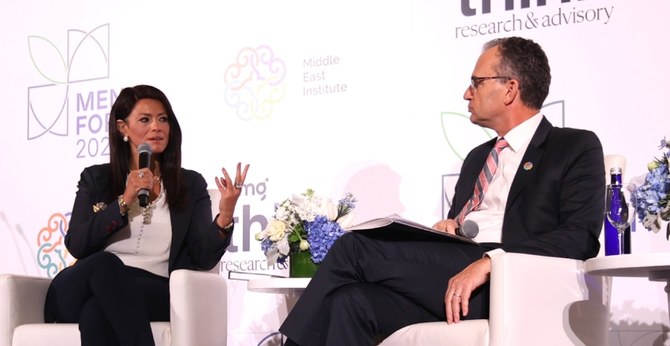
- ARAB NEWS
- 01 Jul 2025

NEW YORK CITY: Arab and international officials and energy and finance experts in New York City at the MENA Forum have discussed the latest political and economic trends in the region, including prospects for peace in Yemen, the shifting role of the US and Saudi Arabia’s rapid non-oil growth.
Co-hosted by SRMG Think and the Middle East Institute at the Yale Club on Friday, the forum’s theme was “Unlocking the region’s potential for prosperity, security and a sustainable global future.”
Officials from a range of Gulf and Arab nations spoke at the forum, including Rania Al-Mashat, Egyptian minister of international cooperation; Ayman Safadi, Jordanian deputy PM; Mariam Al-Mheiri, UAE minister for climate change and environment; and Majed Al-Ansari, Qatari adviser to the prime minister and foreign minister.
Energy and finance experts also took part in panels and fireside chats, including Dr. Helima Croft, head of commodity strategy and MENA research at RBC Capital Markets; Francesco La Camera, chief of the International Renewable Energy Agency; Dr. Sara Vakhshouri, SVB Energy founder and president; and Amer Bisat, Blackrock managing director and head of emerging markets.
The US special envoy for Yemen, Tim Lenderking, also discussed the operation to offload oil from the Safer tanker in the Red Sea, as well as his experiences negotiating with the Houthi militia.
Turkiye’s Deputy Minister of Foreign Affairs Ahmet Yildiz discussed Ankara’s vision for the future.
A common theme at the forum was the de-escalation in tensions in the Middle East in the wake of the Saudi Arabia-Iran rapprochement, and rumors that the Kingdom is considering normalization with Israel.
Lenderking was asked about the potential for peace in Yemen, almost a decade since the country’s conflict began.
He said: “There’s no space in Yemen right now, given the situation that we see for errant approaches from in the region.
“At the end of the day, Saudi Arabia, the UAE, Qatar, Bahrain, Oman, they all want to see peace. There may be differences in approach, but they all want to see this conflict ended.
“And I think you can see that in the efforts Saudi Arabia and Oman are exerting to bring this conflict to a close with UN and international support.”
But Lenderking warned of the need for a deal with the Houthi militia, adding that the humanitarian situation was dire and required a resolution through political means.
“You don’t solve the humanitarian situation in Yemen without a political deal, unless you get agreement between the two parties that drives this situation into a formal peace agreement.”
Qatari ministerial adviser, Majed Al-Ansari, in a fireside discussion, spoke about the future of the US-Gulf relationship.
Despite strong US military activity in Qatar and Washington’s presence in the region “not diminishing from a security perspective,” Al-Ansari said there has been “incoherence” in the US’ Middle East policy.
He added: “This has cost the region a lot. But it has also cost the US and its image in the region a lot.
“And this is why you get a lot of questions from your partners in the region now, (saying) ‘Listen, we need guarantees.’
“We need something on paper, because when push comes to shove, we are really not sure if the US will help or not.”
A panel at the forum — featuring Vakhshouri, Croft and La Camera — discussed energy developments in the region as well as the transition toward renewables through investment.
Vakhshouri stressed the role of national priorities in allocating renewables, saying that Saudi Arabia’s “low-cost resources” and “high government investment” favored the adoption of green and blue hydrogen as viable alternative energy sources.
Blackrock’s Amer Bisat, speaking one-on-one with SRMG Think senior adviser, Hazar Caracalla, hailed the Gulf’s transition away from oil dependency.
He said: “The non-oil sector in the GCC, particularly in Saudi, is 80 percent above where it used to be in 2014. Even in per capita terms, it is 50 percent above where it was around nine years ago.”